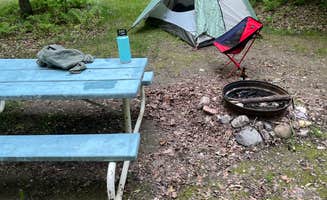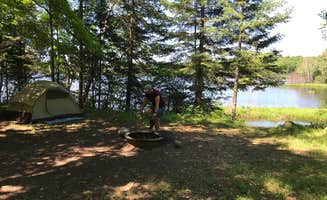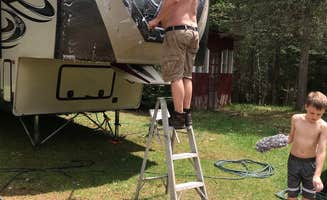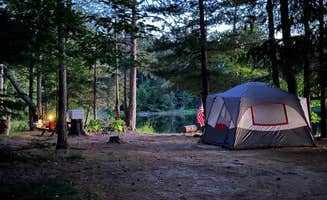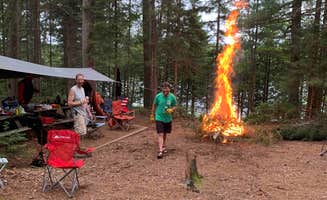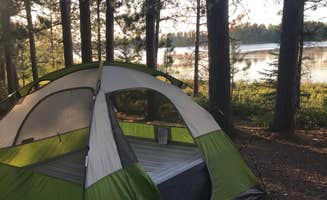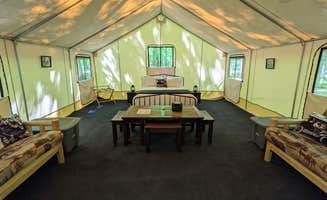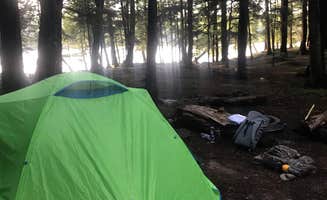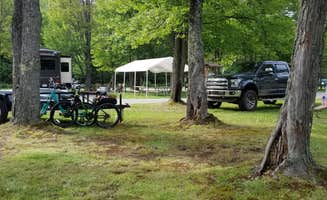Tent camping near Crystal Falls, Michigan provides an authentic wilderness experience in the northern reaches of Michigan's Upper Peninsula. Situated in the remote Ottawa National Forest region, this area receives significant seasonal changes with winter temperatures regularly dropping below 0°F and summer highs averaging 75-80°F. Most primitive camping areas remain accessible from late May through October, though some forest roads become difficult to navigate after heavy rainfall.
What to do
Fishing opportunities: Crystal Falls area lakes offer excellent fishing access with multiple campgrounds situated directly on small lakes. At Craig Lake State Park Campground, one camper noted, "The lake has fantastic fishing for smallmouth, northern pike, crappie, walleye, and the occasional musky." Boat launch facilities at many sites accommodate small watercraft.
Hiking trails: The North Country Trail network provides extensive hiking options throughout the region. At Paint River Forks NF Campground, campers can access riverside trails with clean, well-maintained sites perfect for mid-summer exploration, though one camper warns it's "not a safe spot for early or late season campers."
Wildlife viewing: The remote location offers opportunities to spot diverse wildlife. Near Boulder Junction, one visitor reported, "We were lucky enough to see a white deer." Early morning and dusk provide optimal wildlife viewing times at most campgrounds.
What campers like
Genuine solitude: Many campsites in the region offer true wilderness isolation. One camper at Chequamegon National Forest Perch Lake Campground appreciated that "sites still feel very secluded and private" even on the more accessible south loop with its six sites.
Lake access: Waterfront sites provide convenient recreation options. At East Bass Lake Park, a camper mentioned it's "right on the lake" with only two spots available, making it "a great place for those who want some solitude."
Remote experience: The distance from population centers creates a true wilderness feel. One visitor to Stevens Lake Campground described arriving at dark and being "enchanted by trees, falling leaves and mystic lake," noting the mirror-like surface of the lake in the morning after fog burned off.
What you should know
Water quality concerns: Several campgrounds have issues with drinking water. At Blockhouse Campground, campers must bring all their water as there are no facilities. One visitor warned it's the "most isolated camp site I've been to" requiring driving "8 miles down the road with major washouts."
Limited facilities: Most tent sites are primitive with minimal amenities. Many have no showers, limited cell service, and only vault toilets. One camper at Bates Township Park noted that while the site was a "great find" with "good hosts," tent sites "have some slope toward lake" which limits flat areas when the campground is busy.
Insect activity: Biting insects can be problematic, particularly in early summer. The mosquitoes were described as "horrible" by one camper at Boulder Junction, while another mentioned "horse flys were incredibly bad" at Blockhouse Campground.
Tips for camping with families
Choose established sites: For families with young children, opt for more developed campgrounds. Sites with access to basic facilities provide an easier introduction to remote camping. A visitor to Chequamegon National Forest Perch Lake Campground mentioned it's "a great place to camp if you want to experience being in the woods for the first time."
Bring entertainment: Limited cell reception means electronic entertainment options are minimal. Games, fishing gear, and field guides help keep children engaged. One camper at Boulder Junction mentioned "exploring in the woods" as a family activity despite getting temporarily lost.
Plan for weather changes: Upper Peninsula weather can change rapidly. One family described having "a picnic ruined" by a sudden rainstorm but "had a great laugh making sandwiches in the car." Bring extra tarps and rain gear even during summer months.
Tips from RVers
Access limitations: Many forest roads leading to campgrounds are unpaved and can be challenging. For RVs, sites like Genes Pond State Forest Campground or Deer Lake State Forest Campground provide more accessible options. Avoid very remote sites like Blockhouse where one camper reported "major washouts" on access roads.
Size restrictions: Most campgrounds in the area cannot accommodate large RVs. Small trailers and pop-ups work best, as one camper at East Bass Lake Park noted the "small sites for tent or pop-up" with "no hook-ups."


